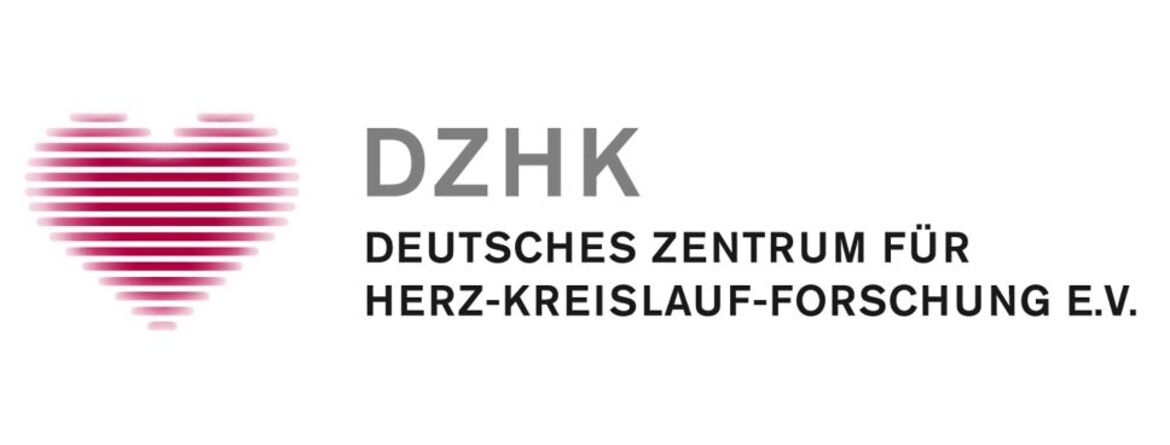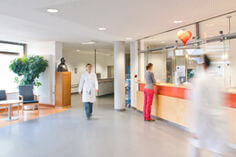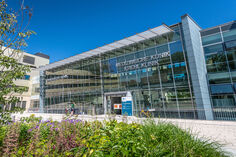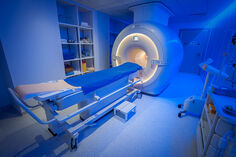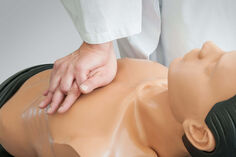- Arbeitsgruppen
- Klinisches Studienzentrum
- Sektion Kardio-Onkologie
- Section of Molecular and Translational Cardiology
- Sektion Internistische Intensivmedizin
- Klaus-Tschira-Institut für Computerkardiologie
- Heisenberg Professur für Immunkardiologie (W3)
- Heisenberg professorship for mRNA metabolismus
- Jun. Professur für Künstliche Intelligenz in der Kardiovaskulären Medizin
- Pregnancy Heart Team: Kardiologie der Schwangerschaft
- DZHK-Standort Heidelberg/Mannheim
- Heidelberg CardioBiobank (HCB)
- Scientific Management and Coordination Unit (SMCU)
Section of Molecular and Translational Cardiology
Our lab focuses on the discovery, development and clinical translation of novel targets for heart failure (HF) therapy.
HF, the disability of the cardiac muscle to provide sufficient circulatory support at rest and exercise, currently has limited treatment options and patients suffering from severe HF (NYHA III/IV) face a 5-year mortality > 50%. In light of this therapeutic dilemma, our research efforts are targeted towards innovative treatments emerging from the investigation of the physiological role, pathophysiological relevance and therapeutic potential of S100 proteins in cardiac and vascular disease.
In the last decade, our group pioneered research focusing on the role of S100 proteins in cardiovascular physiology and disease.
In particular, we characterized S100A1, being the cardiac specific S100 isoform, as a calcium-dependent inotrope with anti-arrhythmic and anti-apoptotic properties. S100A1’s unique inotropic actions in the heart are independent and additive to beta-adrenergic stimulation and cAMP-PKA dependent signaling. Our work shows that loss of S100A1 in diseased myocardium is a critical factor in heart failure development and progression. Based on these results, we are developing gene therapy approaches to restore S100A1 protein that can restore cardiomyocyte contractility and reduced adverse remodeling in the diseased myocardium.
In addition, we have explored S100A1’s function in endothelial cells and pertinent regulation of vascular function and blood pressure. Although expressed at significantly lower levels than in cardiomyocytes, we uncovered a crucial role of endothelial S100A1 in endothelial cell NO-homeostasis and blood pressure regulation. Given the world-wide significance of hypertensive disease, our translational efforts are directed towards the development of novel S100A1-based anti-hypertensive therapeutic strategies.
Due to known extracellular S100 functions, we have characterized S100A1 as a cardiac alarmin being released upon ischemic damage from cardiomyocytes in the extracellular environment and circulation. S100A1 participates in healing after myocardial infarction (MI) through modulation of post-MI inflammation and recruitment of stem cells to the site of cardiac injury. Our efforts are directed towards therapeutic use and manipulation of MI-released S100A1 to improve post-MI healing and regeneration.
An exciting new option stems from our recent insight into therapeutic potential of S100A1 derived peptides. S100A1 derived peptides demonstrate a similar therapeutical profile than the native protein and enable systemic therapeutic options for e.g. acute cardiac decompensation.
- Arbeitsgruppen
- Klinisches Studienzentrum
- Sektion Kardio-Onkologie
- Section of Molecular and Translational Cardiology
- Sektion Internistische Intensivmedizin
- Klaus-Tschira-Institut für Computerkardiologie
- Heisenberg Professur für Immunkardiologie (W3)
- Heisenberg professorship for mRNA metabolismus
- Jun. Professur für Künstliche Intelligenz in der Kardiovaskulären Medizin
- Pregnancy Heart Team: Kardiologie der Schwangerschaft
- DZHK-Standort Heidelberg/Mannheim
- Heidelberg CardioBiobank (HCB)
- Scientific Management and Coordination Unit (SMCU)
